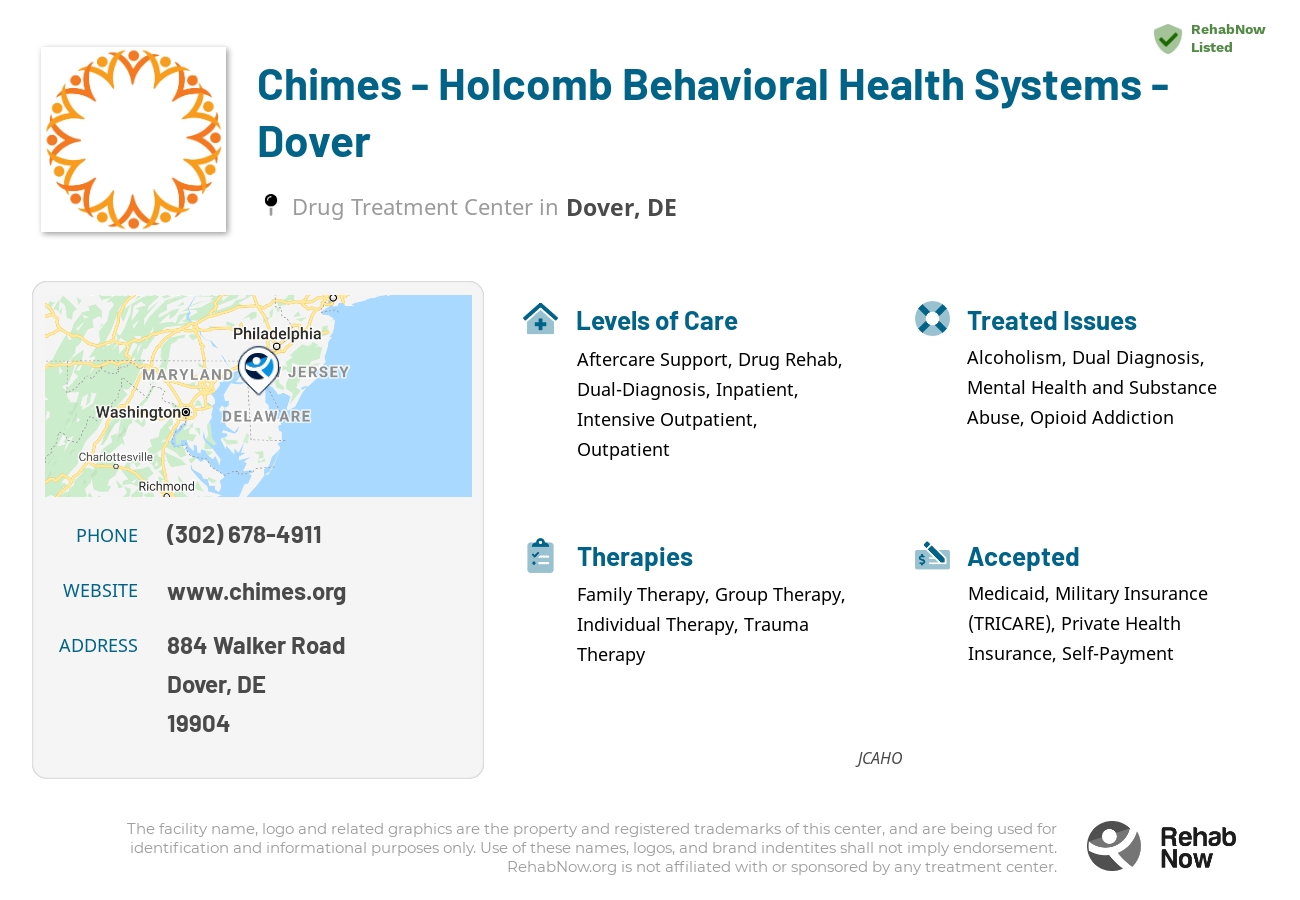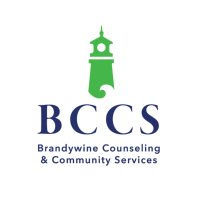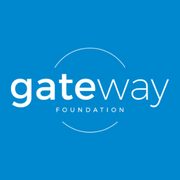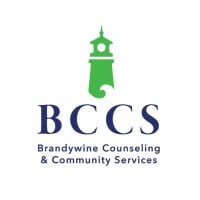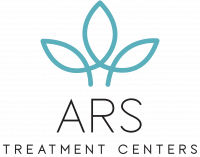Chimes - Holcomb Behavioral Health Systems - Dover
Drug Rehab Center in Dover, Delaware
Chimes is a comprehensive substance abuse and addiction treatment facility located in Dover, Delaware that offers a wide range of services to clients seeking assistance with addiction and substance abuse issues including mental health services, dual diagnosis services, substance abuse recovery and prevention support, relapse prevention, anger management, family intervention, and case management.
About Chimes - Holcomb Behavioral Health Systems - Dover in Delaware
Chimes - Holcomb Behavioral Health Systems - Dover is a comprehensive behavioral healthcare facility located in Dover, Delaware. It offers a wide range of services to clients seeking assistance with addiction and substance abuse issues. Their staff of experienced professionals is dedicated to helping individuals and families recover from substance abuse and lead healthier, more fulfilling lives. The facility specializes in providing services for individuals with complex needs, including mental health services, dual diagnosis services, substance abuse recovery and prevention support, relapse prevention, anger management, family intervention, and case management.
At Chimes - Holcomb Behavioral Health Systems - Dover, treatment options for addiction and substance abuse include individual and group counseling, medication-assisted treatment, family counseling and support, intensive outpatient treatment, aftercare planning, and relapse prevention. Clients are provided with comprehensive evaluation, education, and therapy to address the physical and emotional aspects of their substance abuse and work on strategies for long-term recovery. Furthermore, the facility offers career counseling and job placement services to assist clients in achieving their recovery goals.
Chimes - Holcomb Behavioral Health Systems - Dover is accredited by The Joint Commission, which is a nationally-recognized accreditation organization that sets the highest standards in the healthcare field. They are also certified by the Delaware Department of Health and Social Services, and have received recognition from the Delaware General Assembly for their outstanding care and commitment to the community. In addition, Chimes - Holcomb Behavioral Health Systems - Dover offers specialized programs for youth, veterans, and individuals impacted by trauma, as well as community-based education and support services.
Genders
Ages
Modality
Additional
Accreditations

JCAHO
Conditions and Issues Treated
Opioid addiction starts when a person becomes addicted to legal or illegal opioids. The addiction can happen quickly, in just a matter of days. Opioid withdrawal can be extremely uncomfortable and lead the user to continue to use even if they want to quit. Stopping using an opioid requires medical observation. Sometimes inpatient treatment with a medically supervised detox is necessary for managing the withdrawal process while learning lasting tools for maintaining recovery. Medications may be used in some cases of opioid addiction.
Opioid addiction is one of Delaware‘s most prominent forms of addiction. It’s treated by detoxifying the body so that the chemicals from the medications no longer impact them and by therapies to correct behavior and target the root of the problem.
Recovery is not simply about stopping drug use. Recovery is working with addiction while recovering mental health issues that are fueling the addiction in the first place.
Levels of Care Offered
This center offers a variety of custom treatment tailored to individual recovery. Currently available are Aftercare Support, Drug Rehab, Dual-Diagnosis, Inpatient, Intensive Outpatient, Outpatient, with additional therapies available as listed below.
Individuals who are suffering from severe addiction or have a high risk for dangerous health concerns are often recommended to receive inpatient treatment.
Choosing to enter an inpatient treatment program is beneficial for people who are suffering from severe addiction, or who have a high risk for dangerous health concerns.
Inpatient treatment is beneficial for:
- People who have a history of severe withdrawal.
- People who have attempted to overcome addiction on their own without success.
- People who have a history of relapse, or have recently relapsed.
- People at risk for drug overdose or withdrawal-related complications.
- People with medical conditions that are worsened by drug or alcohol use.
Addicts who need help with their addiction can enroll in an intensive outpatient program (IOP). But the patient won’t live there during treatment.
IOP involves patients visiting a medical office building regularly for therapy and other services while continuing to live their lives.
IOP is a step up from drug or alcohol detox, but it’s still a phase of recovery, not the end goal. Patients in need of IOP have many options for rehab and treatment.
Outpatient treatment is considered the lower intensity level of addiction treatment. It’s ideal for early phase addiction or lower intensity addictions. It may include weekly sessions instead of daily. It may include weekly sessions instead of daily. Peer group support, 12-step programs, and individual counseling may still be involved but at a lesser frequency than an intensive outpatient program. It is a good choice for someone who doesn’t need to go through a medically supervised detox and who has a supportive home environment. It requires motivation and dedication to commit to the program without constant monitoring.
Aftercare support should take place after outpatient treatment has ended. There are a few different types of aftercare support that patients can seek. These include 12 Step, Self-help groups (AA, NA), Therapeutic communities, Long-term, structured sober living arrangements, and Halfway houses (residential treatment centers).
Therapies & Programs
Individual therapy involves one-on-one sessions between the patient and therapist. It provides patients with a safe environment to openly discuss personal and sensitive issues with the therapist. They find the therapist as someone they can trust. Individual therapy aims to identify the core issues that would have led the patient to substance abuse and address them effectively. The therapist can develop patient-specific customized solutions through individual therapy, which aids speedier recovery.
Family therapy is a group problem-solving that aims to improve communication and relationships between the addict, their family, and sometimes friends. The main goal of family therapy for drug addiction is to create an environment where communication can occur without judgment, hostility, or blame. The therapist is with the family as they learn to communicate differently, especially with the addict when s/he is using. The family can learn to reduce their enabling behavior or rally together and support each other during tough times.
An addict’s family can play a vital part in helping them to avoid relapse because they can spot the warning signs and help them get back on track before it becomes too much of a problem. Family therapy is one of the most effective ways to help addicts stay on the path to long-term sobriety. When a drug addict decides that they want to try and get sober, it takes the support of every person they love to succeed. It can be incredibly difficult for loved ones to watch an addict go through the pain and suffering of withdrawal, but by being there with them and supporting them, they can help to make sure that the addiction never returns.
Groups typically involve meetings with other recovering addicts who can relate to one another’s experiences. They might meet in person or online and typically focus on the process of staying sober rather than overcoming a specific addiction.
In these groups managed by Chimes - Holcomb Behavioral Health Systems - Dover, addicts can build a sense of community and develop strong emotional connections with others who understand what they are going through. These beneficial relationships can help addicts overcome their cravings and prevent relapse at any point during the recovery process.
In general, trauma therapy is a clinical process that helps individuals deal with mental stress often caused by traumatic events. The therapist helps the person identify, understand, and work through the problem. This is done with the help of talking about it in group or one-on-one counseling sessions. Therapists use relaxation, role-playing, art, and music to help the person open up about what is bothering them.
There are many different types of trauma therapists, such as psychiatric nurses and counselors. Not everyone is a good candidate for this type of therapy; it is generally reserved for people who have recently experienced a traumatic event and struggle to get over it. It is often done for children, teenage victims of sexual assault, and war veterans.
There is hope for people who are addicted to drugs and alcohol. Cognitive Behavioral Therapy (CBT) is the solution. CBT focuses on the underlying thoughts and behaviors that caused the addiction problem in the first place and may cause a relapse. This type of psychotherapy addresses negative feelings common in substance abuse disorders. It helps to change them by restructuring thought patterns. It’s about removing negative thoughts and providing long-term benefits while promoting self-awareness, self-control, and healthy ways to respond to negative thoughts. These sessions can be done by themselves or as part of combination therapy.
Payment Options Accepted
For specific insurance or payment methods please contact us.
Is your insurance accepted?
Ask an expert, call (888) 674-0062
Chimes Associated Centers
Discover treatment facilities under the same provider.
- Chimes - Holcomb Behavioral Health Systems - Pike Media in Media, PA
- Chimes - Holcomb Behavioral Health Systems - Kennett Square in Kennett Square, PA
- Chimes - Holcomb Behavioral Health Systems - Allentown in Allentown, PA
- Chimes - Holcomb Behavioral Health Systems - Reading in Reading, PA
- Chimes - Holcomb Behavioral Health Systems - Exton in Exton, PA
Learn More About Chimes Centers
Additional Details
Specifics, location, and helpful extra information.
Dover, Delaware 19904 Phone Number(302) 678-4911 Meta DetailsUpdated November 25, 2023
Staff Verified
Chimes - Holcomb Behavioral Health Systems - Dover Patient Reviews
There are no reviews yet. Be the first one to write one.
Dover, Delaware Addiction Information
The Delaware substance abuse statistics show that the number of deaths due to drug injury is higher than the national average. Over 16% of all deaths in the state between 2008 and 2017 were caused by drugs and alcohol. The state has been rolling out more services to address addiction in an effort to get help to those who need it.
Dover, Delaware has a high rate of drug abuse. Marijuana, heroin, and prescription opioids are the most commonly abused drugs. 12.1% of people over the age of 11 in Dover had an addiction to drugs or alcohol. 12.1% of people over the age of 11 in Dover had an addiction to drugs or alcohol. There are many different types of treatment available in Dover. Such as detox and outpatient treatment.
Treatment in Nearby Cities
- Milford, DE (18.8 mi.)
- Rehoboth Beach, DE (40.0 mi.)
- Laurel, DE (42.4 mi.)
- Millsboro, DE (42.2 mi.)
- Smyrna, DE (9.6 mi.)
Centers near Chimes - Holcomb Behavioral Health Systems - Dover
The facility name, logo and brand are the property and registered trademarks of Chimes - Holcomb Behavioral Health Systems - Dover, and are being used for identification and informational purposes only. Use of these names, logos and brands shall not imply endorsement. RehabNow.org is not affiliated with or sponsored by Chimes - Holcomb Behavioral Health Systems - Dover.



